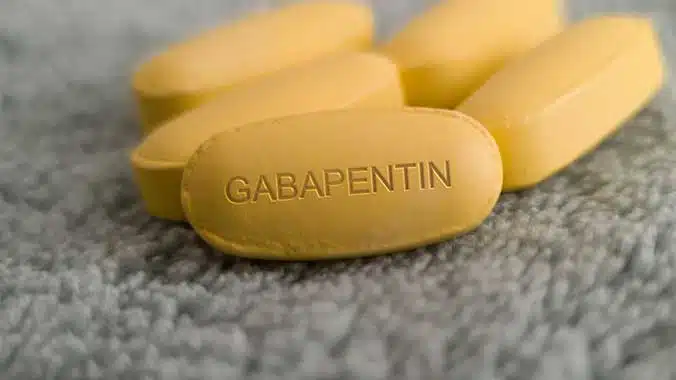Can Gabapentin Potentiate Opioids? | Effects & Risks
- Does Gabapentin Potentiate Opioids?
- Side Effects Of Mixing Opioids & Gabapentin
- How To Avoid The Risks

Gabapentin is a prescription medication. It’s used to prevent seizures in people with epilepsy and to treat a painful complication of shingles called postherpetic neuralgia.
It’s also prescribed off-label to treat other conditions, including anxiety, bipolar disorder, and chronic pain. When prescribed for chronic pain, it’s sometimes used alongside opioid painkillers like oxycodone and hydromorphone.
Some people also mix gabapentin and opioids to get high. In either case, mixing these drugs can be risky.
Does Gabapentin Enhance Opioids?
Both gabapentin and opioids are central nervous system (CNS) depressants. That means they slow down brain activity, which can make you feel sleepy and relaxed.
They can also cause euphoria (a feeling of intense pleasure), especially if you mix them. Thus, mixing gabapentin and opioids can enhance euphoria as well as sleepiness, relaxation, and other depressant effects.
Effects & Risks Of Mixing Gabapentin & Opioids
While combining gabapentin and opioids can increase euphoria, it can also increase the negative side effects of both drugs. In addition, it can raise your risk of opioid overdose and addiction.
Increased Side Effects
Since gabapentin and opioids are both CNS depressants, they can have similar side effects, including:
- drowsiness
- headache
- dry mouth
- nausea and vomiting
- constipation
The drugs can also have rarer, more serious side effects, such as:
- hoarseness
- trouble swallowing or breathing
- rash
- swelling
- extreme drowsiness
- seizures
Mixing the drugs may increase your risk of experiencing these effects.
Overdose
Both gabapentin and opioids slow down your breathing. When you combine them, you face a high risk of respiratory depression, which is a condition that makes it hard to breathe.
Respiratory depression is the most common cause of opioid overdose. Common symptoms of an opioid overdose include:
- extreme drowsiness
- confusion
- nausea and vomiting
- pale, clammy, or bluish skin
- bluish lips and/or fingernails
- smaller pupils
- slowed breathing
- slowed heart rate
- low blood pressure
- loss of consciousness
- seizures
If you or someone you know experiences these symptoms, call 911 right away. Also, administer naloxone if you have it. Naloxone (brand name Narcan) is a medication that can quickly reverse an opioid overdose. You can get it at most pharmacies without a prescription.
When left untreated, an opioid overdose can be fatal. According to a 2017 study published in the PLOS (Public Library of Science) Medicine journal, taking moderate or high doses of gabapentin raises your risk of opioid overdose death by almost 60%.
Addiction
Because gabapentin can enhance the pleasant effects of opioids, it may make you more likely to develop an opioid use disorder or OUD. A 2016 study showed that between 15% and 22% of people with opioid addiction abused gabapentin (used gabapentin in a manner not prescribed).
Opioid addiction is a serious disease that makes you feel unable to stop using opioids. Common symptoms include:
- tolerance (needing increasingly larger or more frequent doses of opioids to feel the desired effects)
- physical dependence (experiencing withdrawal symptoms, such as sweating and anxiety, when you don’t use opioids)
- mood swings
- loss of interest in activities once enjoyed
- loss of motivation
- trouble concentrating
- avoidance of family and friends
- decline in personal hygiene
How To Avoid The Risks Of Mixing Gabapentin & Opioids
To avoid the above risks, only mix gabapentin and opioids when your doctor prescribes it.
Your doctor can closely monitor you for any negative side effects and change your prescription if needed. If you feel unable to stop mixing gabapentin and opioids, seek help at an addiction treatment center.
Opioid Addiction Treatment
The most effective treatments for opioid addiction include:
- medical detox, in which doctors help you safely stop using opioids with minimal withdrawal symptoms
- cognitive behavioral therapy, in which a mental health professional helps you change unhealthy behaviors and beliefs related to your addiction
- medication-assisted treatment, in which doctors prescribe medications to ease opioid cravings and withdrawal symptoms
- support groups, in which you can discuss your experiences and coping strategies with other people recovering from opioid addiction
To learn more about addiction treatment options, please reach out to an Ark Behavioral Health specialist. Our inpatient and outpatient treatment providers offer a variety of evidence-based services to help you or your loved one stay healthy and sober.
Written by Ark Behavioral Health Editorial Team
©2024 Ark National Holdings, LLC. | All Rights Reserved.
This page does not provide medical advice.
Canadian Medical Association Journal - Gabapentin misuse
Centers for Disease Control and Prevention - Notes from the Field: Trends in Gabapentin Detection and Involvement in Drug Overdose Deaths -- 23 States and the District of Columbia, 2019-2020
National Library of Medicine: MedlinePlus - Gabapentin
PLoS Medicine — Gabapentin, opioids, and the risk of opioid-related death: A population-based nested case–control study - Gabapentin, opioids, and the risk of opioid-related death: A population-based nested case–control study

Questions About Treatment?
Ark Behavioral Health offers 100% confidential substance abuse assessment and treatment placement tailored to your individual needs. Achieve long-term recovery.
100% confidential. We respect your privacy.
Prefer Texting?
Our friendly support team is here to chat 24/7. Opt out any time.







 Learn More
Learn More








